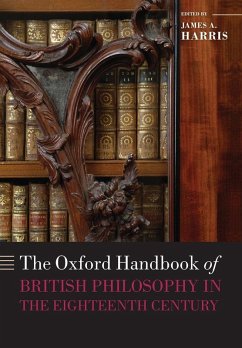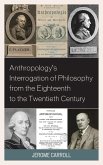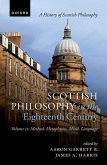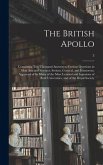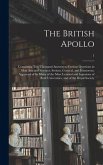The Oxford Handbook of British Philosophy in the Eighteenth Century
Herausgeber: Harris, James A.
The Oxford Handbook of British Philosophy in the Eighteenth Century
Herausgeber: Harris, James A.
- Broschiertes Buch
- Merkliste
- Auf die Merkliste
- Bewerten Bewerten
- Teilen
- Produkt teilen
- Produkterinnerung
- Produkterinnerung
This is the first book to provide comprehensive coverage of the full range of philosophical writing in Britain in the eighteenth century. A team of experts provides new accounts of both major and lesser-known thinkers, and explores the diverse approaches in the period to logic and metaphysics, the passions, morality, criticism, and politics.
Andere Kunden interessierten sich auch für
![Beyond Autonomy in Eighteenth-Century British and German Aesthetics Beyond Autonomy in Eighteenth-Century British and German Aesthetics]() Beyond Autonomy in Eighteenth-Century British and German Aesthetics217,99 €
Beyond Autonomy in Eighteenth-Century British and German Aesthetics217,99 €![Moral Philosophy in Eighteenth-Century Britain Moral Philosophy in Eighteenth-Century Britain]() Colin HeydtMoral Philosophy in Eighteenth-Century Britain98,99 €
Colin HeydtMoral Philosophy in Eighteenth-Century Britain98,99 €![Anthropology's Interrogation of Philosophy from the Eighteenth to the Twentieth Century Anthropology's Interrogation of Philosophy from the Eighteenth to the Twentieth Century]() Jerome Fanning Marsden CarrollAnthropology's Interrogation of Philosophy from the Eighteenth to the Twentieth Century138,99 €
Jerome Fanning Marsden CarrollAnthropology's Interrogation of Philosophy from the Eighteenth to the Twentieth Century138,99 €![Scottish Philosophy in the Eighteenth Century, Volume II Scottish Philosophy in the Eighteenth Century, Volume II]() Scottish Philosophy in the Eighteenth Century, Volume II133,99 €
Scottish Philosophy in the Eighteenth Century, Volume II133,99 €![Bernard Bosanquet and the Legacy of British Idealism Bernard Bosanquet and the Legacy of British Idealism]() Bernard Bosanquet and the Legacy of British Idealism107,99 €
Bernard Bosanquet and the Legacy of British Idealism107,99 €![The British Apollo The British Apollo]() AnonymousThe British Apollo40,99 €
AnonymousThe British Apollo40,99 €![The British Apollo The British Apollo]() AnonymousThe British Apollo40,99 €
AnonymousThe British Apollo40,99 €-
-
-
This is the first book to provide comprehensive coverage of the full range of philosophical writing in Britain in the eighteenth century. A team of experts provides new accounts of both major and lesser-known thinkers, and explores the diverse approaches in the period to logic and metaphysics, the passions, morality, criticism, and politics.
Hinweis: Dieser Artikel kann nur an eine deutsche Lieferadresse ausgeliefert werden.
Hinweis: Dieser Artikel kann nur an eine deutsche Lieferadresse ausgeliefert werden.
Produktdetails
- Produktdetails
- Verlag: OUP Oxford
- Seitenzahl: 688
- Erscheinungstermin: 26. Januar 2017
- Englisch
- Abmessung: 244mm x 170mm x 37mm
- Gewicht: 1167g
- ISBN-13: 9780198776659
- ISBN-10: 0198776659
- Artikelnr.: 47866822
- Herstellerkennzeichnung
- Libri GmbH
- Europaallee 1
- 36244 Bad Hersfeld
- gpsr@libri.de
- Verlag: OUP Oxford
- Seitenzahl: 688
- Erscheinungstermin: 26. Januar 2017
- Englisch
- Abmessung: 244mm x 170mm x 37mm
- Gewicht: 1167g
- ISBN-13: 9780198776659
- ISBN-10: 0198776659
- Artikelnr.: 47866822
- Herstellerkennzeichnung
- Libri GmbH
- Europaallee 1
- 36244 Bad Hersfeld
- gpsr@libri.de
James A. Harris is Senior Lecturer in Philosophy at the University of St Andrews. He is the author of Of Liberty and Necessity: The Free Will Debate in Eighteenth-Century British Philosophy (OUP, 2005), and of articles on Hume, Hutcheson, Reid, Beattie, Priestley, and a number of themes in eighteenth-century British thought. He has edited texts by Reid, Beattie, Kames, and Abraham Tucker. He is writing an intellectual biography of Hume for Cambridge University Press, and also the eighteenth-century British philosophy volume of the new Oxford History of Philosophy.
* Introduction
* PART 1: THE LANGUAGES OF PHILOSOPHY IN EIGHTEENTH-CENTURY BRITAIN
* 1: TIMOTHY STANTON: Locke and his legacy
* 2: ERIC SCHLIESSER: Newton and Newtonianism in eighteenth-century
British thought
* 3: JACQUELINE TAYLOR: The idea of a science of human nature
* 4: PADDY BULLARD: Rhetoric and eloquence: the language of persuasion
* PART 2: LOGIC AND METAPHYSICS
* 5: REBECCA COPENHAVER: Perception and the Language of Nature
* 6: LAURENT JAFFRO: Language and thought
* 7: JOHN P. WRIGHT: The understanding
* 8: AARON GARRETT: Mind and matter
* PART 3: THE PASSIONS
* 9: AMY SCHMITTER: Passions, affections, sentiments: taxonomy and
terminology
* 10: TERENCE CUNEO: Reason and the passions
* 11: SEAN GREENBERG: Liberty and necessity
* 12: JAMES A. HARRIS: The government of the passions
* PART 4: MORALS
* 13: CHRISTIAN MAURER: Self-interest and sociability
* 14: P. J. E. KAIL: Moral judgment
* 15: Dario Perinetti: The nature of virtue
* 16: COLIN HEYDT: Practical ethics
* PART 5: CRITICISM
* 17: PAUL GUYER: The pleasures of the imagination and the objects of
taste
* 18: TIMOTHY M. COSTELLOE: The faculty of taste
* 19: EVA DADLEZ: The pleasures of tragedy
* 20: PETER KIVY: Genius and the creative imagination
* PART 6: POLITICS
* 21: DARIO CASTIGLIONE: The origin of civil government
* 22: CRAIG SMITH: Forms of government
* 23: NEIL McARTHUR: Reform and revolution
* 24: RICHARD WHATMORE: Luxury, commerce, and the rise of political
economy
* PART 7: PHILOSOPHY AND RELIGION
* 25: PAUL RUSSELL: Causation, cosmology, and the limits of philosophy:
the early eighteenth-century British debate
* 26: ALEXANDER BROADIE: Philosophy, revealed religion, and 'The
Enlightenment'
* 27: THOMAS AHNERT: Religion and morality
* PART 1: THE LANGUAGES OF PHILOSOPHY IN EIGHTEENTH-CENTURY BRITAIN
* 1: TIMOTHY STANTON: Locke and his legacy
* 2: ERIC SCHLIESSER: Newton and Newtonianism in eighteenth-century
British thought
* 3: JACQUELINE TAYLOR: The idea of a science of human nature
* 4: PADDY BULLARD: Rhetoric and eloquence: the language of persuasion
* PART 2: LOGIC AND METAPHYSICS
* 5: REBECCA COPENHAVER: Perception and the Language of Nature
* 6: LAURENT JAFFRO: Language and thought
* 7: JOHN P. WRIGHT: The understanding
* 8: AARON GARRETT: Mind and matter
* PART 3: THE PASSIONS
* 9: AMY SCHMITTER: Passions, affections, sentiments: taxonomy and
terminology
* 10: TERENCE CUNEO: Reason and the passions
* 11: SEAN GREENBERG: Liberty and necessity
* 12: JAMES A. HARRIS: The government of the passions
* PART 4: MORALS
* 13: CHRISTIAN MAURER: Self-interest and sociability
* 14: P. J. E. KAIL: Moral judgment
* 15: Dario Perinetti: The nature of virtue
* 16: COLIN HEYDT: Practical ethics
* PART 5: CRITICISM
* 17: PAUL GUYER: The pleasures of the imagination and the objects of
taste
* 18: TIMOTHY M. COSTELLOE: The faculty of taste
* 19: EVA DADLEZ: The pleasures of tragedy
* 20: PETER KIVY: Genius and the creative imagination
* PART 6: POLITICS
* 21: DARIO CASTIGLIONE: The origin of civil government
* 22: CRAIG SMITH: Forms of government
* 23: NEIL McARTHUR: Reform and revolution
* 24: RICHARD WHATMORE: Luxury, commerce, and the rise of political
economy
* PART 7: PHILOSOPHY AND RELIGION
* 25: PAUL RUSSELL: Causation, cosmology, and the limits of philosophy:
the early eighteenth-century British debate
* 26: ALEXANDER BROADIE: Philosophy, revealed religion, and 'The
Enlightenment'
* 27: THOMAS AHNERT: Religion and morality
* Introduction
* PART 1: THE LANGUAGES OF PHILOSOPHY IN EIGHTEENTH-CENTURY BRITAIN
* 1: TIMOTHY STANTON: Locke and his legacy
* 2: ERIC SCHLIESSER: Newton and Newtonianism in eighteenth-century
British thought
* 3: JACQUELINE TAYLOR: The idea of a science of human nature
* 4: PADDY BULLARD: Rhetoric and eloquence: the language of persuasion
* PART 2: LOGIC AND METAPHYSICS
* 5: REBECCA COPENHAVER: Perception and the Language of Nature
* 6: LAURENT JAFFRO: Language and thought
* 7: JOHN P. WRIGHT: The understanding
* 8: AARON GARRETT: Mind and matter
* PART 3: THE PASSIONS
* 9: AMY SCHMITTER: Passions, affections, sentiments: taxonomy and
terminology
* 10: TERENCE CUNEO: Reason and the passions
* 11: SEAN GREENBERG: Liberty and necessity
* 12: JAMES A. HARRIS: The government of the passions
* PART 4: MORALS
* 13: CHRISTIAN MAURER: Self-interest and sociability
* 14: P. J. E. KAIL: Moral judgment
* 15: Dario Perinetti: The nature of virtue
* 16: COLIN HEYDT: Practical ethics
* PART 5: CRITICISM
* 17: PAUL GUYER: The pleasures of the imagination and the objects of
taste
* 18: TIMOTHY M. COSTELLOE: The faculty of taste
* 19: EVA DADLEZ: The pleasures of tragedy
* 20: PETER KIVY: Genius and the creative imagination
* PART 6: POLITICS
* 21: DARIO CASTIGLIONE: The origin of civil government
* 22: CRAIG SMITH: Forms of government
* 23: NEIL McARTHUR: Reform and revolution
* 24: RICHARD WHATMORE: Luxury, commerce, and the rise of political
economy
* PART 7: PHILOSOPHY AND RELIGION
* 25: PAUL RUSSELL: Causation, cosmology, and the limits of philosophy:
the early eighteenth-century British debate
* 26: ALEXANDER BROADIE: Philosophy, revealed religion, and 'The
Enlightenment'
* 27: THOMAS AHNERT: Religion and morality
* PART 1: THE LANGUAGES OF PHILOSOPHY IN EIGHTEENTH-CENTURY BRITAIN
* 1: TIMOTHY STANTON: Locke and his legacy
* 2: ERIC SCHLIESSER: Newton and Newtonianism in eighteenth-century
British thought
* 3: JACQUELINE TAYLOR: The idea of a science of human nature
* 4: PADDY BULLARD: Rhetoric and eloquence: the language of persuasion
* PART 2: LOGIC AND METAPHYSICS
* 5: REBECCA COPENHAVER: Perception and the Language of Nature
* 6: LAURENT JAFFRO: Language and thought
* 7: JOHN P. WRIGHT: The understanding
* 8: AARON GARRETT: Mind and matter
* PART 3: THE PASSIONS
* 9: AMY SCHMITTER: Passions, affections, sentiments: taxonomy and
terminology
* 10: TERENCE CUNEO: Reason and the passions
* 11: SEAN GREENBERG: Liberty and necessity
* 12: JAMES A. HARRIS: The government of the passions
* PART 4: MORALS
* 13: CHRISTIAN MAURER: Self-interest and sociability
* 14: P. J. E. KAIL: Moral judgment
* 15: Dario Perinetti: The nature of virtue
* 16: COLIN HEYDT: Practical ethics
* PART 5: CRITICISM
* 17: PAUL GUYER: The pleasures of the imagination and the objects of
taste
* 18: TIMOTHY M. COSTELLOE: The faculty of taste
* 19: EVA DADLEZ: The pleasures of tragedy
* 20: PETER KIVY: Genius and the creative imagination
* PART 6: POLITICS
* 21: DARIO CASTIGLIONE: The origin of civil government
* 22: CRAIG SMITH: Forms of government
* 23: NEIL McARTHUR: Reform and revolution
* 24: RICHARD WHATMORE: Luxury, commerce, and the rise of political
economy
* PART 7: PHILOSOPHY AND RELIGION
* 25: PAUL RUSSELL: Causation, cosmology, and the limits of philosophy:
the early eighteenth-century British debate
* 26: ALEXANDER BROADIE: Philosophy, revealed religion, and 'The
Enlightenment'
* 27: THOMAS AHNERT: Religion and morality

